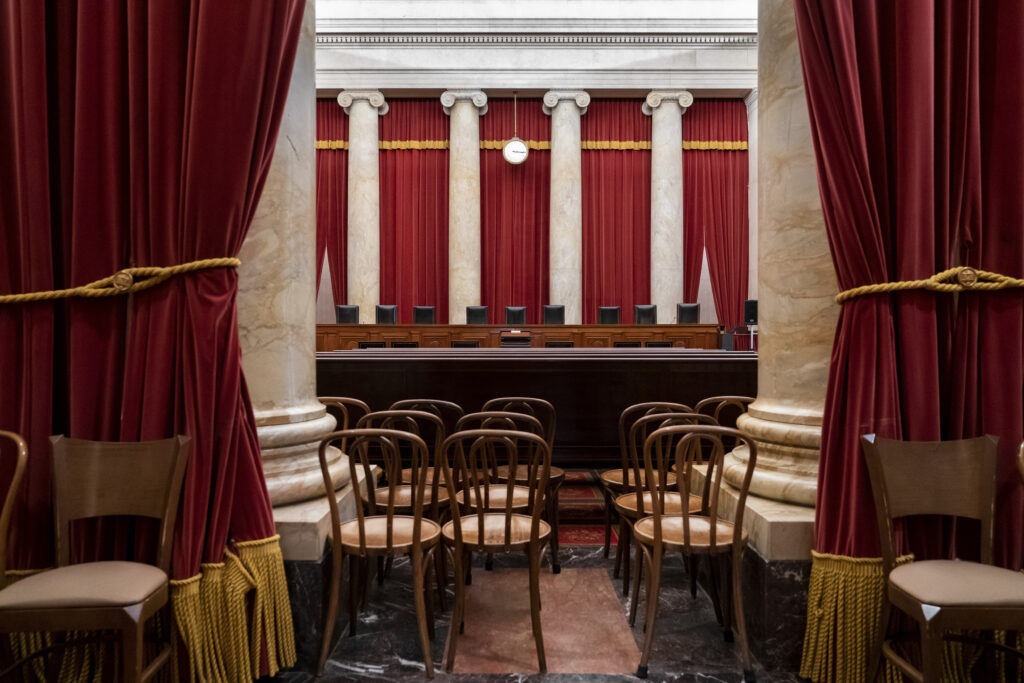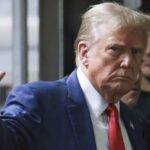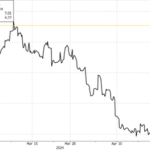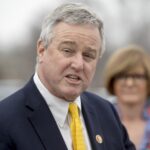
The Supreme Court will soon weigh Donald Trump‘s claim that presidential immunity should shield him from prosecution — prompting former generals, officials, and allied legal minds to chime in on the former president’s argument.
So far, 18 groups have submitted amicus briefs or “friend of the court” filings related to the immunity case that express a range of ideas surrounding Trump’s arguments that he enjoys “absolute immunity” from criminal prosecution for his official acts. Lower courts thus far have denied Trump’s effort to avoid trial over a four-count indictment by special counsel Jack Smith accusing the former president of attempting to upend the results of the 2020 election.

On April 25, the Supreme Court will hear Trump v. United States, which asks the justices to determine: “Whether and if so to what extent does a former president enjoy presidential immunity from criminal prosecution for conduct alleged to involve official acts during his tenure in office.”
The high court is fielding hundreds of pages of filings on the docket. One of the broadest amicus briefs in support of Trump was filed on March 19 by Alabama Attorney General Steve Marshall, leading 18 states in a filing that suggested the U.S. Court of Appeals for the District of Columbia Circuit erred when it ruled that the risk of partisan prosecution is “slight,” according to the 38-page brief.
“After waiting 30 months to indict President Trump, the Special Counsel has demanded extreme expedition from every court at every stage of the case. His only stated reason, the ‘public interest,’ is so thin it’s almost transparent,” Marshall wrote, adding that the timing of the prosecution was designed to inflict “maximum damage” on President Joe Biden‘s political opponent.
Marshall indicated that the timing of the indictment brought against Trump “shows that the risk of partisan prosecutions is anything but ‘slight.’”
Another brief by the Kansas Republican Party and 17 other states addressed the immunity matter head-on, arguing that a finding against Trump’s request would “severely weaken” the effectiveness of the president’s abilities along with his or her administration.
“Further, such a finding would render the legal principles behind the doctrine of absolute immunity meaningless, affecting elected Democrat and Republican office holders alike,” according to the 19-page brief from the Kansas GOP.
Other amici in the case included a collaboration between Citizens United, the nonprofit organization behind the high court’s 2010 decision that allowed corporations to spend unlimited funds on political donations, and two former U.S. attorneys general.
Edwin Meese III and Michael B. Mukasey, attorneys general under Presidents Ronald Reagan and George W. Bush, respectively, teamed up with Citizens United to attack the legitimacy of the team of federal prosecutors targeting Trump, while largely avoiding the immunity question at hand.
The group wrote that Smith “wields tremendous power, effectively answerable to no one, by design,” arguing his assignment to the case was unconstitutional without the Senate’s confirmation. They argue that Attorney General Merrick Garland erred with Smith’s appointment and that he should have followed the same procedure used in a separate Hunter Biden investigation with the appointment of Senate-confirmed federal prosecutor U.S. Attorney David Weiss of Delaware.
“Garland cited as statutory authority for this appointment 28 U.S.C. §§ 509, 510, 515, and 533. But none of those statutes, nor any other statutory or constitutional provision, remotely authorized the appointment” of Smith, Meese and others wrote, referring to the special counsel as merely a “private citizen.”
Trump “should not need to assert any defense—including immunity—against a private citizen.”
But not every amicus brief was supportive of Trump’s side.
Three retired officials, including Lt. Gen. Keith Kellogg, who once was Trump’s acting national security adviser, former Department of Veterans Affairs Secretary Robert Wilkie, and retired Lieutenant General William Gerald “Jerry” Boykin, took issue with a claim Trump attorney D. John Sauer made about the scope of immunity Trump claims he possesses.
Under questioning, Sauer told the appeals court on Jan. 9 that a president who ordered the military to assassinate a political rival or sold pardons to criminals could be criminally prosecuted only if he is first impeached and convicted by Congress.
“Could a president order SEAL Team Six to assassinate a political rival?” Circuit Judge Florence Pan, a Biden nominee, posed hypothetically. “That is an official act, an order to SEAL Team Six.”
“My answer is yes,” Sauer said, but he contended “there is a political process that would have to occur,” referring to impeachment.
While the former military officials did not broach the matter of presidential immunity, they emphatically wrote that a “President cannot order the military to assassinate a political rival and have that order carried out,” according to their 14-page brief, marking the first time former military officials have had to make such a claim in a legal brief.
The array of briefs already filed on the docket follows Smith’s Feb. 14 response to the Supreme Court asking the justices not to take up the case, a request the high court ultimately denied on Feb. 28 when it agreed to consider the appeal.
CLICK HERE TO READ MORE FROM THE WASHINGTON EXAMINER
“The thorough opinions of the courts below considering and unanimously rejecting his arguments — and applicant’s failure to point to any Founding Era suggestion of such absolute immunity, any former President making such a claim, or even any scholarly commentary positing such immunity — underscore how remote the possibility is that this Court will agree with his unprecedented legal position,” Smith wrote in his 39-page brief.
Smith and other amici in opposition to Trump’s presidential immunity claims have until Monday to file a response on the high court’s docket, and any reply briefs can be made on or before April 15.






